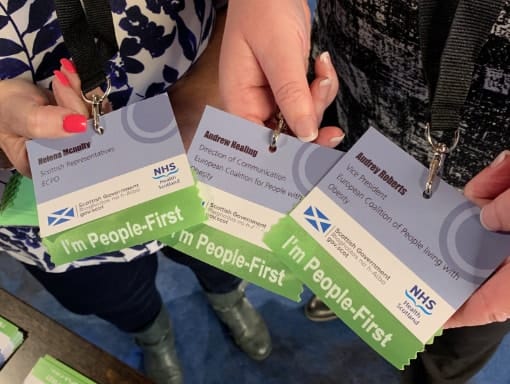How to Support People First
The ECPO People First Language (PFL) campaign was launched ECO2019 in Glasgow, By ECPO, However, People First Language for Obesity has been driven from our colleagues around the world in recent years.
How can you support Person/People First Language?
People-first language (PFL), also called person-first language (PFL), is a type of linguistic prescription which puts a person before a diagnosis, describing what a person “has” rather than asserting what a person “is.”
By using Person/People First Language, you can avoid marginalisation or dehumanisation (either consciously or subconsciously) when discussing people with a chronic illness or disability. It can be seen as a type of disability etiquette but person-first language can also be more generally applied to any group that would otherwise be defined or mentally categorized by a condition or trait (for example, race, age, or appearance).
Person-first language avoids using labels or adjectives to define someone, utilising terms such as “a person with diabetes” or “a person with alcoholism,” instead of “a diabetic” or “an alcoholic.” The intention is that a person is seen foremost as a person and only secondly as a person with some trait. Advocates of person-first language point to the failure to mentally separate the person from the trait as reinforcing a sense that both the trait and the person are inherently bad or inferior, leading to discrimination whilst also implicitly reinforcing a sense of permanency even regarding issues that are likely to be temporary. For example, a person with a substance use disorder has a fair chance of achieving long-term remission—many years in which they are healthy and productive—but calling them a “substance abuser” reinforces an unspoken sense that they are inherently and permanently tainted and casts doubt on maintenance of remission.
*Taken from Wikipedia
As our friends at OAC say, People-First Language is not something new; however, it is new to the obesity community. For years, other chronic disease, such as those in the mental health and disabilities community, have adopted People-First Language and encouraged its usage in all reporting.
Person-first language is the standard for respectfully addressing individuals with chronic conditions & diseases. Rather than labelling people by their disease, physicians, clinicians and scientists recognise the need to understand, and address the unique barriers to dialogue associated with obesity.
We at ECPO, call for the use of Person First language in all reporting of Obesity from the media, to the general public. We are people who live with Obesity, and we deserve respectful and dignified language when our disease is discussed. We are not defined by our Obesity, we are people, who live with Obesity.
We demand to be referred to in non discrimatory, Non Stigmatising and non offensive terms.
To reduce negative feelings in an individual, it can be helpful, and we ask to emphasise that obesity is a clinical term, rather than a description of physical appearance.
EXAMPLES of how to use People first language
Using phrases and terms as below is helpful.
- Obesity, not Obese
- A person living with Obesity, Not an Obese person.
- Weight, not heaviness/large
- Severe obesity, rather than morbid obesity

